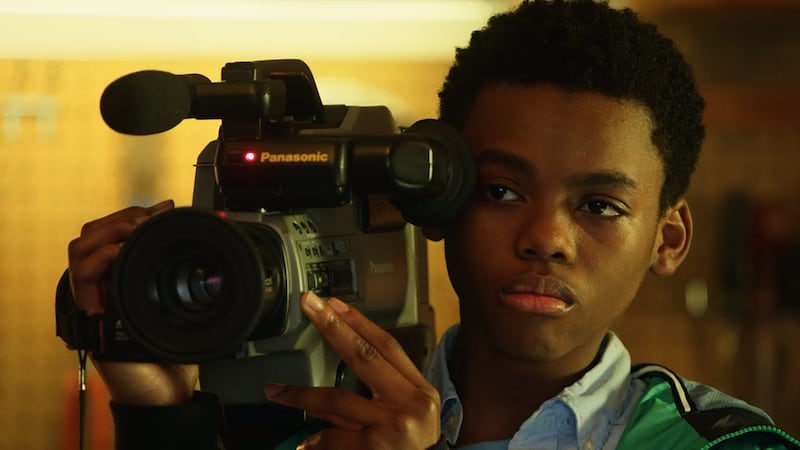Apparently, the dream of the '90s now lives a little south of Portland.
Well before its 10 episodes were unfurled, Everything Sucks! was trumpeted as Netflix's latest triumph of tastemaking faux nostalgia. But while the success of retroscapes like Stranger Things doubtlessly eased production, the Oregon City-shot, Boring-set program more directly harks back to Happy Days, The Wonder Years, That '70s Show, Freaks and Geeks and every other prime-time staple mining laughs from the travails of the last generation. Comedy, as they say, equals tragedy plus time.
Though it ostensibly details the misadventures of three misfits aiding the A/V club against the school's fearsome theater troupe, Everything Sucks! focuses more on the doomed flirtations of budding auteur Luke (Jahi Di'Allo Winston) as he vainly tries to win the heart of the principal's daughter Kate (Peyton Kennedy) just as she accepts herself as a lesbian.
Where past retro-coms ignored any obligation to their supposed settings beyond the odd newspaper headline or Top 40 staple, the early episodes of Everything Sucks! dissolve into an endless whirl of disjointed references, dimly remembered tropes and misused phrasings. "All that and a bag of chips" was only ever said ironically and, inside Clackamas County, perhaps never said at all. The effect approximates a semilucid slumber alongside an I Love the '90s marathon, which isn't quite as dreadful as might be expected. However awkward the constant flood of time-worn memes and outdated lingo may seem in the moment, the faux-nostalgic eventually blurs into a constant undercurrent and highlights poignant moments by its absence.
Plus, awkwardness is essentially the catalyst for Everything Sucks! The cringe-worthy retro-speak feels regrettable precisely because we all remember fumbling about with overheard slang or second-hand opinions spurred by an all-consuming drive to belong—desperately groping toward relevance through a pop-culture fusillade.
In a weird way, the overreliance on hackneyed verbal tropes furthers the show's shaggy realism. As Luke's cohorts, Rio Mangini and Quinn Liebling lean into their banter with a keening gracelessness. However absurdly their plot lines may twist, there's a believability about the main characters. The series takes pains to ensure the kids always seem like kids, even as their over-cited era and under-explored hometown feel utterly removed from any recognizable time and place.
In the first episode, while Kate and Luke walk back from school, they run across a few tourists marveling at the town signage. The scene occurs just after talk of Tori Amos and right before they discuss Oasis, so any escape from era-identifying signifiers would've felt poignant. But there's a note of genuine melancholy when Luke wryly noted passers-by "never go into town, they just take a picture and then leave."
Weirdly, though, neither do we. For all the picturesque establishing shots of a riverside locale far lovelier than the dumpy pasture land of the actual town, we glimpse Boring proper purely through a handful of weathered storefronts (Vinyl Verdict, The Crouton Factory) hinting an exurban squalor that makes less and less sense for a community whose high school boasts closed-circuit morning news broadcasts and SoCal location shoots for a frosh-helmed student film.
Portland's cultural footprint is limited to a brief Aladdin visit and background music from the Softies. Los Angeles holds more significance, though in an odd twist of fate, the Sandy, Ore., Blockbuster took the place of an otherwise nonexistent LA franchise. Even the lure of New York, which claims alpha thespian Oliver (an incandescent Elijah Stevenson) and sets in motion Kate's romantic awakening, feels more prominent.
To be sure, any high school boasting a principal so slavishly tolerant or student hierarchy this supremely twee (our heroes are bullied, once again, by the drama club) holds more than a whiff of nascent Portlandia. But grounding the stories within a fundamentally featureless every-burg allowed Everything Sucks! to embellish flights of fancy and propel momentum through a self-sustaining dream logic as the leads range further and further from any recognizable adolescent routine. Let the kids fly free, but keep Boring dull.
SEE IT: Everything Sucks! is now streaming on Netflix.
